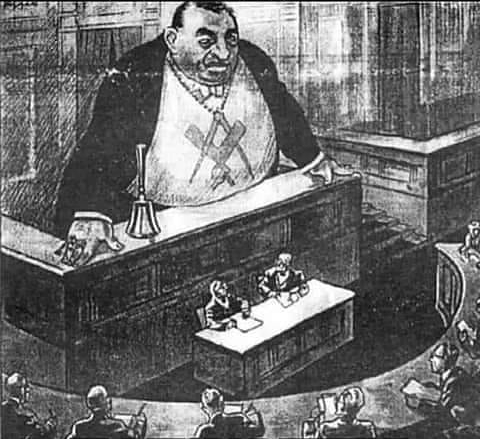ed note–Again, this–a dated OpEd by this guy, David Frum–
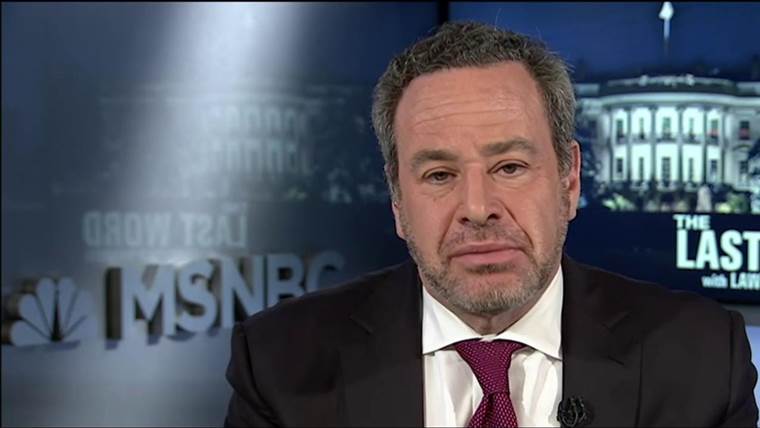
–provides a better perspective/understanding of the contents of the piece recently posted here, which very clearly and WITHOUT ANY AMBIGUITY WHATSOEVER assigns the ‘credit’ for seeing both DJT removed from 1600 and Biden ushered in to none other than Neo-Con, Inc which includes the Hebrish gangster pic’d above, who along with his guy–
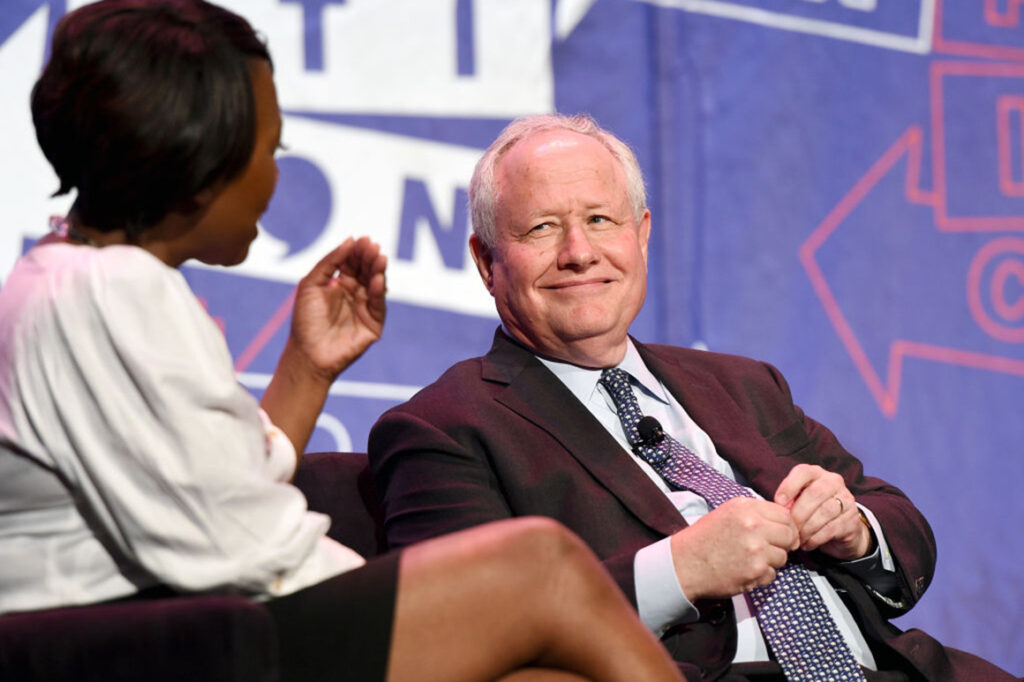
and this guy
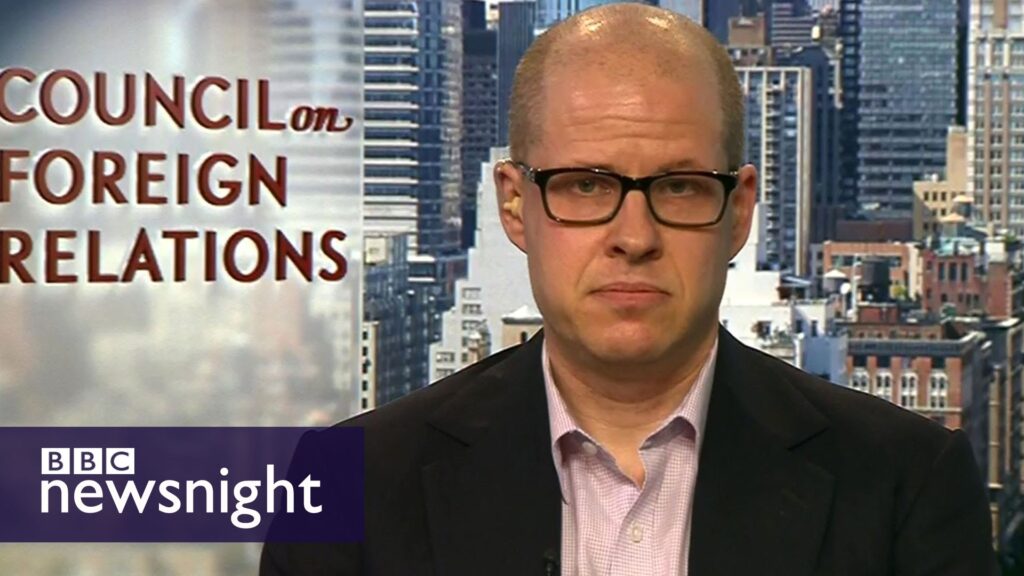
and this gal
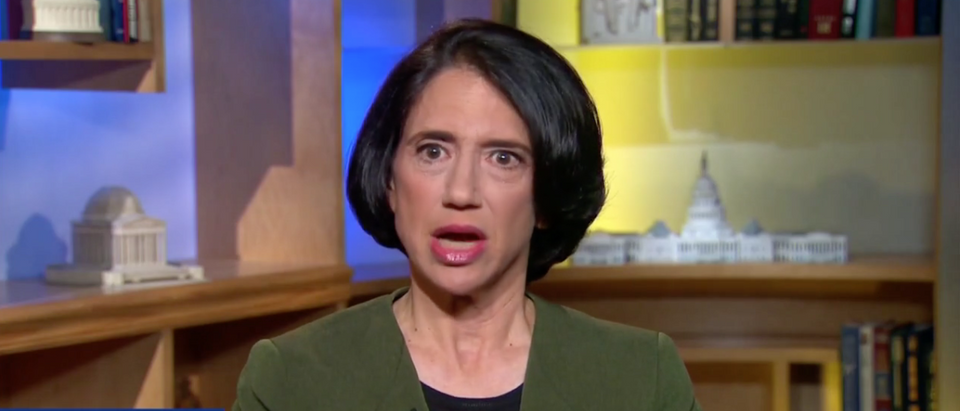
…And an entire pigpen chock-full of other sayanim working for Israeli intelligence who were as much engaged in Netanyahu’s takedown of DJT and his removal from 1600 as they were engaged in the Israeli-intelligence operation aimed at seducing the American mind into going to war in the Middle East for Israel’s benefit after that nation’s assassination/misinformation service Mossad engineered the 9/11 terrorist attacks.
And again, we would be culpably-remiss if we did not point out the fact that for 5 years, an entire gaggle of circus performers claiming various degrees of expert-cy on matters related to the particular geo-politics where the organized forces of anti-Gentilism (OFAG) are concerned paid not as much as a GRAIN OF SALT worth of attention to what was the 24/7/365 intelligence operation (organized and executed by the likes of the above-mentioned sayanim working for Israeli intelligence) against the person and presidency of DJT as a result of his stated plans of bringing to a screeching halt those same ‘endless wars’ which the above-mentioned sayanim were tasked with helping get started in the immediate aftermath of the Israeli-engineered terrorist attacks on 9/11.
Now, as far as the piece itself goes, we will forewarn the brave reader who dares wade herein that it is yet another typically verbose, reality-bending manifestation of Judaic pil-pul that is as much a part of ALL fever-brained, deranged and delusional Zionist hasbara for which Frum and his fellow shul-mates are famous ever since the days of Abraham selling Sarah into sexual slavery to Egypt’s Pharaoh as recounted in the book of Jenesis.
However, the reader will clearly see how and why Frum & co–acting as domestic tentacles of Israel’s Mossad disinformation/psychological war apparatus in America– decided PDQ that DJT simply had to go once he uttered the unforgivable words ‘endless wars’ in the 2016 Presidential race.
By DAVID FRUM
From the very beginning of the War on Terror, there has been dissent, and as the war has proceeded to Iraq, the dissent has grown more radical and more vociferous.
Perhaps that was to be expected. But here is what never could have been: Some of the leading figures in this antiwar movement call themselves “conservatives.”
These conservatives are relatively few in number, but their ambitions are large. They aspire to reinvent conservative ideology: to junk the 50-year-old conservative commitment to defend American interests and values throughout the world — the commitment that inspired the founding of this magazine — in favor of a fearful policy of ignoring threats and appeasing enemies.
And they are exerting influence. When Richard Perle appeared on Meet the Press on February 23 of this year, Tim Russert asked him, “Can you assure American viewers . . . that we’re in this situation against Saddam Hussein and his removal for American security interests? And what would be the link in terms of Israel?” Perle rebutted the allegation. But what a grand victory for the antiwar conservatives that Russert felt he had to air it.
You may know the names of these antiwar conservatives. Some are famous: Patrick Buchanan and Robert Novak. Others are not: Llewellyn Rockwell, Samuel Francis, Thomas Fleming, Scott McConnell, Justin Raimondo, Joe Sobran, Charley Reese, Jude Wanniski, Eric Margolis, and Taki Theodoracopulos.
The antiwar conservatives aren’t satisfied merely to question the wisdom of an Iraq war. Questions are perfectly reasonable, indeed valuable. There is more than one way to wage the war on terror, and thoughtful people will naturally disagree about how best to do it, whether to focus on terrorist organizations like al-Qaeda and Hezbollah or on states like Iraq and Iran; and if states, then which state first?
But the antiwar conservatives have gone far, far beyond the advocacy of alternative strategies. They have made common cause with the left-wing and Islamist antiwar movements in this country and in Europe. They deny and excuse terror. They espouse a potentially self-fulfilling defeatism. They publicize wild conspiracy theories. And some of them explicitly yearn for the victory of their nation’s enemies.
Common cause: The websites of the antiwar conservatives approvingly cite and link to the writings of John Pilger, Robert Fisk, Noam Chomsky, Ted Rall, Gore Vidal, Alexander Cockburn, and other anti-Americans of the far Left.
Terror denial: In his column of December 26, 2002, Robert Novak attacked Condoleezza Rice for citing Hezbollah, instead of al-Qaeda, as the world’s most dangerous terrorist organization: “In truth, Hezbollah is the world’s most dangerous terrorist organization from Israel’s standpoint. While viciously anti-American in rhetoric, the Lebanon-based Hezbollah is focused on the destruction of Israel. ‘Outside this fight [against Israel], we have done nothing,’ Sheik Hassan Nasrallah, the organization’s secretary-general, said in a recent New York Times interview.” The sheik did not say, and Novak did not bother to add, that Hezbollah twice bombed the U.S. Embassy in Beirut, murdering more than 60 people, and drove a suicide bomb into a Marine barracks in October 1983, killing 241 servicemen.
Espousing defeatism: Here is Robert Novak again, this time on September 17, 2001, predicting that any campaign in Afghanistan would be a futile slaughter: “The CIA, in its present state, is viewed by its Capitol Hill overseers as incapable of targeting bin Laden. That leads to an irresistible impulse to satisfy Americans by pulverizing Afghanistan.” And here is Patrick Buchanan that same day gloomily asserting that the United States would be as baffled by Osama bin Laden as the British Empire was by George Washington: “We remain unrivaled in material wealth and military dominance, but these are no longer the components of might. . . . Our instinct is the strongman’s impulse: hit back, harder. But like British Lobsterbacks dropped in a colonial wilderness, we don’t know this battle, and the weapons within our reach are blunt.”
Excuse-making: On September 30, 2002, Pat Buchanan offered this explanation of 9/11 during a debate on Chris Matthews’s Hardball: “9/11 was a direct consequence of the United States meddling in an area of the world where we do not belong and where we are not wanted. We were attacked because we were on Saudi sacred soil and we are so-called repressing the Iraqis and we’re supporting Israel and all the rest of it.”
Conspiracy-theorizing: Justin Raimondo, an Internet journalist who delivered Pat Buchanan’s nominating speech at the Reform party convention in 2000, alleged in December 2001 that Israel was implicated in the terror attacks of 9/11: “Whether Israeli intelligence was watching, overseeing, collaborating with or combating the bin Ladenites is an open question. . . . That the Israelis had some significant foreknowledge and involvement in the events preceding 9/11 seems beyond dispute.” Raimondo has also repeatedly dropped broad hints that he believes the October 2001 anthrax attacks were the work of an American Jewish scientist bent on stampeding the U.S. into war.
Yearning for defeat: On January 30, 2002, Eric Margolis, the American-born foreign editor of the Toronto Sun, appealed to the leaders of the Arab world to unite in battle against the U.S. “What could Arabs do to prevent a war of aggression against Iraq that increasingly resembles a medieval crusade? Form a united diplomatic front that demands U.N. inspections continue. Stage an oil boycott of the U.S. if Iraq is attacked. Send 250,000 civilians from across the Arab World to form human shields around Baghdad and other Iraqi cities. Boycott Britain, Turkey, Kuwait, and the Gulf states that join or abet the U.S. invasion of Iraq. Withdraw all funds on deposit in U.S. and British banks. Accept payment for oil only in Euros, not dollars. Send Arab League troops to Iraq, so that an attack on Iraq is an attack on the entire League. Cancel billions worth of arms contracts with the U.S. and Britain. At least make a token show of male hormones and national pride.”
Raimondo was more explicit still on March 12, 2003. Speaking of the negative consequences he foresaw of even a successful American campaign in Iraq, he wrote: “It is a high price to pay for ‘victory’ — so high that patriots might almost be forgiven if they pine for defeat.”
The writers I quote call themselves “paleoconservatives,” implying that they are somehow the inheritors of an older, purer conservatism than that upheld by their impostor rivals. But even Robert Taft and Charles Lindbergh ceased accommodating Axis aggression after Pearl Harbor. Since 9/11, by contrast, the paleoconservatives have collapsed into a mood of despairing surrender unparalleled since the Vichy republic went out of business. James Burnham famously defined liberalism as “the ideology of Western suicide.”
What are we to make of self-described conservatives who see it as their role to make excuses for suicide bombers?
In August 1990, Saddam Hussein invaded and annexed Kuwait. Iraq plus Kuwait and prospectively Saudi Arabia would possess the world’s biggest reservoir of oil. With this vast new oil wealth, Saddam could at last acquire the nuclear weapons he coveted — and thus dominate the entire Middle East. President George H. W. Bush quickly decided that the conquest of Kuwait “will not stand” and assembled a global coalition against Saddam. The paleoconservative repudiation of the Gulf War would be their first major independent ideological adventure.
Three weeks after the invasion, Pat Buchanan declared his opposition to war in one of his regular appearances on The McLaughlin Group: “There are only two groups that are beating the drums for war in the Middle East — the Israeli defense ministry and its amen corner in the United States.”
It would be hard to come up with a more improbable idea than that of George H. W. Bush of Kennebunkport as a warmaking servant of the interests of International Jewry.
Yet over the next six months, Buchanan and other writers would repeatedly argue that America was being dragged to war in the Gulf by a neoconservative coterie indifferent to true American interests: the “neoconservatives,” as Buchanan said, “the ex-liberals, socialists, and Trotskyists who signed on in the name of anti-Communism and now control our foundations and set the limits of permissible dissent.”
Early in 1990, Buchanan published an article calling for a new foreign policy of “America First.” And “America First” would be the slogan of Buchanan’s presidential run in 1992: more irony, because by 1992 the paleos were frankly disgusted, not merely with the rest of the conservative movement and the Republican party, but with much of America. “Last month,” Buchanan wrote in 1991, “during a week at CNN in New York, I rode nightly up Eighth Avenue in a cab. It was like passing through a different world. We are two countries; and many Americans in the first country are getting weary of subsidizing and explaining away the deepening failure of the second, and want only to get clear of it.”
Fed up as they were with the Second America, however, the paleos felt sure that they spoke for the First America with an integrity the traditional conservatives, let alone the neos, never had. Samuel Francis in particular scolded National Review’s conservatives for their isolation from America’s “grassroots.” He chose an interesting means of illustrating his point: “Of the twenty-five conservative intellectuals whose photographs appeared on the dust jacket of George H. Nash’s The Conservative Intellectual Movement in America Since 1945, published in 1976, four are Roman Catholic, seven are Jewish, another seven (including three Jews) are foreign-born, two are southern or western in origin, and only five are in any respect representative of the historically dominant Anglo-Saxon (or at least Anglo-Celtic) Protestant strain in American history and culture (three of the five later converted to Roman Catholicism).” No wonder then that these fringe characters were able to achieve nothing more impressive than the election of Ronald Reagan and victory in the Cold War.
Now Francis had the helm of an ideological movement of his own. “A new American Right,” he wrote in 1991, “must recognize that its values and goals lie outside and against the establishment and that its natural allies are not in Manhattan, Yale, and Washington but in the increasingly alienated and threatened strata of Middle America. . . . A new Right, positioning itself in opposition to the elite and the elite’s underclass ally, can assert its leadership of Middle Americans and mobilize them in radical opposition to the regime.”
Of all the limits against which the paleoconservatives chafed, the single most irksome was the limit placed by civilized opinion upon overtly racialist speech. Francis’s speech at the 1994 conference of the white-supremacist American Renaissance organization, for example, ultimately cost him his job as a staff columnist at the Washington Times. Today he earns his living as editor-in-chief of the Citizens’ Informer, the newspaper of the Council of Conservative Citizens, the successor group to the White Citizens’ Councils of the segregated South; he moonlights as an editor of The Occidental Quarterly, a pseudo-scholarly “journal of Western thought and opinion.”
Conservatives have had a vexed history with the topic of race. In the 1950s and early 1960s, many conservatives, including the editors of this magazine, questioned and opposed the civil rights movement, sometimes for high-minded constitutional reasons, sometimes not. Race, though, was not in those days central to conservative thinking, if only because, as Francis himself noted, the early conservative movement was so urban and northern. For the paleos, however, race and ethnicity were from the start essential and defining issues — and so they remain to this day.
White racialists of the late 20th and early 21st centuries have to resolve a puzzling paradox. On one hand, they believe in the incorrigible inferiority of darker-skinned people. On the other hand, they perceive darker-skinned people to be gaining the advantage over whites.
How to resolve the contradiction? One solution is to posit the existence of a third force, a group that is cunning and capable but, for reasons of its own, implacably hostile to America’s white majority.
“Jewish intellectuals initiated and advanced a number of important intellectual and political movements during the 20th century. I argue that these movements are attempts to alter Western societies . . . to weaken the power of the Jews’ perceived competitors — the European peoples who early in the 20th century had assumed a dominant position not only in their traditional homelands in Europe, but also in the United States, Canada, and Australia.”
The author of those words, Kevin MacDonald of the California State University at Long Beach, does not quite belong to the paleoconservative club, although he does publish in The Occidental Quarterly. Yet MacDonald’s name and ideas do keep turning up in paleo conversation. On March 17, 2003, for example, VDare.com prominently posted on its homepage an anonymous letter celebrating MacDonald’s work and quoting his allegation that the Iraq war “is being fomented by Jewish neo-conservative activists based in the Bush administration, congressional lobbying organizations, and the media.” More generally, MacDonald said — and VDare.com repeated — “the most important Jewish contributions to culture were facilitated not only by high IQ but by closely cooperating, mutually reinforcing groups of Jews who were centered around charismatic leaders and excluded dissenters.”
Erstwhile National Review editor Joseph Sobran also seems to have been greatly influenced by MacDonald’s writings. After the defeat of his friend Buchanan’s second presidential campaign, Sobran wrote: “The full story is impossible to tell as long as it’s taboo to discuss Jewish interests as freely as we discuss those of the Christian Right. Talking about American politics without mentioning the Jews is a little like talking about the NBA without mentioning the Chicago Bulls.”
Sobran was following MacDonald’s advice: “It is time to be frank about Jews.”
“The Bush administration should not only ignore the advice of such characters as Mr. Ledeen and Mr. Podhoretz but consider placing them under surveillance as possible agents of a foreign power.”— Samuel Francis, in Chronicles, December 2002
Who was the first paleo to blame Israel for 9/11? It’s a close call, but Robert Novak seems to have won the race. His column of September 13, 2001, written the very day after the terrorist attack, charged that “the hatred toward the United States today by the terrorists is an extension of [their] hatred of Israel.” Novak lamented that, because of terror, “the United States and Israel are brought ever closer in a way that cannot improve long-term U.S. policy objectives.”
The next day, Scott McConnell quoted Malcolm X on Justin Raimondo’s website: “The chickens have come home to roost.” Raimondo himself soon began work on a book that alleged that 9/11 was in the broadest sense an Israeli plot.
“Whose war is this?” Buchanan demanded to know on September 26, 2001: “Powell’s war — or Perle’s?” “Judging from President Bush’s State of the Union message,” Sobran lamented on January 31, 2002, “what began as the War on Terrorism will now be broadened to become a War to Crush Israel’s Enemies.”
“In private conversation with Sen. Chuck Hagel and many other members of Congress,” Robert Novak wrote on December 26, 2002, Israeli prime minister Ariel Sharon “leaves no doubt that the greatest U.S. assistance to Israel would be to overthrow Saddam Hussein’s Iraqi regime. That view is widely shared inside the Bush administration, and is a major reason U.S. forces today are assembling for war.”
The accusations culminated in a March 2003 article by Buchanan in The American Conservative that fixed responsibility for the entire Iraq war on a “cabal” of neoconservative office-holders and writers:
“We charge that a cabal of polemicists and public officials seeks to ensnare our country in a series of wars that are not in America’s interests. We charge them with colluding with Israel to ignite those wars and destroy the Oslo Accords. We charge them with deliberately damaging U.S. relations with every state in the Arab world that defies Israel or supports the Palestinian people’s right to a homeland of their own. We charge that they have alienated friends and allies all over the Islamic and Western world through their arrogance, hubris, and bellicosity.”
Who were these war-mongering “neoconservatives”? At a June 2002 conference sponsored by the Institute for Historical Review, the leading Holocaust-denial group, Joe Sobran defined “neoconservatism” as “kosher conservatism.” And in his March cover story, Buchanan seasoned Sobran’s definition with his own flavorful malice. “Cui Bono? For whose benefit these endless wars in a region that holds nothing vital to America save oil, which the Arabs must sell us to survive? Who would benefit from a war of civilizations between the West and Islam? Answer: one nation, one leader, one party. Israel, Sharon, Likud.”
The echo in that previous paragraph of the Nazi slogan “Ein Volk, ein Reich, ein Führer” is unlikely to have been unintentional. Yes, it was indeed time to “be frank about Jews.”
Having quickly decided that the War on Terror was a Jewish war, the paleos equally swiftly concluded that they wanted no part of it. It’s odd: 9/11 actually vindicated some of the things that the paleos had been arguing, particularly about immigration and national cohesion. But the paleos were in no mood to press their case. Instead, they plunged into apologetics for the enemy and wishful defeatism.
On September 16, 2001, Samuel Francis suggested that America deserved what it got on 9/11: “Some day it might actually dawn on someone in this country that the grown-up but unwelcome answer is that the terrorists attacked us because they were paying us back for what we had started. Let us hear no more about how the ‘terrorists’ have ‘declared war on America.’ Any nation that allows a criminal chief executive to use its military power to slaughter civilians in unprovoked and legally unauthorized attacks for his own personal political purposes” — Francis is referring here both to Operation Desert Fox in 1998 and to the Kosovo war — “can expect whatever the ‘terrorists’ dish out to it.”
It seems incredible, but there is actually more. “If, as President Bush told us this week, we should make no distinction between those who harbor terrorists and those who commit terrorist acts, neither can any distinction be made between those who tolerate the murderous policies of a criminal in power and the criminal himself.”
The 9/11 attacks sent Patrick Buchanan plunging into handwringing and pessimism. He wrote on September 28, 2001: “We are told the first target of America’s wrath will be the Taliban. But if we rain fire and death on the Afghan nation, a proud, brave people we helped liberate from Soviet bondage, we too will slaughter hundreds of innocents. And as they count their dead, the Afghans too will unite in moral outrage; and, as they cannot fight cruise missiles or Stealth bombers, they will attack our diplomats, businessmen, tourists.”
“The U.S. government has probably killed more people outside its own borders than any other. Or am I overlooking something?” — Joseph Sobran, speech to the John Randolph Society, Herndon, VA., January 1992
And now it is time to be very frank about the paleos. During the Clinton years, many conservatives succumbed to a kind of gloom. With Bill Bennett, they mourned the “death of outrage.” America now has non-metaphorical deaths to mourn. There is no shortage of outrage — and the cultural pessimism of the 1990s has been dispelled. The nation responded to the terrorist attacks with a surge of patriotism and pride, along with a much-needed dose of charity. Suddenly, many conservatives found they could look past the rancor of the Clinton years, past the psychobabble of the New Age gurus, past the politically correct professors, to see an America that remained, in every important way, the America of 1941 and 1917 and 1861 and 1776. As Tennyson could have said: “What we were, we are.”
America has social problems; the American family is genuinely troubled. The conservatism of the future must be a social as well as an economic conservatism. But after the heroism and patriotism of 9/11 it must also be an optimistic conservatism.
There is, however, a fringe attached to the conservative world that cannot overcome its despair and alienation. The resentments are too intense, the bitterness too unappeasable. Only the boldest of them as yet explicitly acknowledge their wish to see the United States defeated in the War on Terror. But they are thinking about defeat, and wishing for it, and they will take pleasure in it if it should happen.
They began by hating the neoconservatives. They came to hate their party and this president. They have finished by hating their country.
War is a great clarifier. It forces people to take sides. The paleoconservatives have chosen — and the rest of us must choose too. In a time of danger, they have turned their backs on their country. Now we must turn our backs on them.
